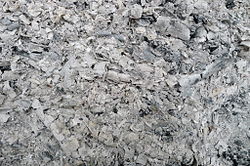tuhka
Hello, you have come here looking for the meaning of the word tuhka. In DICTIOUS you will not only get to know all the dictionary meanings for the word tuhka, but we will also tell you about its etymology, its characteristics and you will know how to say tuhka in singular and plural. Everything you need to know about the word tuhka you have here. The definition of the word tuhka will help you to be more precise and correct when speaking or writing your texts. Knowing the definition oftuhka, as well as those of other words, enriches your vocabulary and provides you with more and better linguistic resources.


Tuhkaa.
Estonian
Noun
tuhka
Finnish

Etymology
From Proto-Finnic *tuhka, likely borrowed from Proto-Germanic *tuska-, *tuskijaną (“to torch, to burn”). Cognate of Estonian tuhk.
Pronunciation
Noun
tuhka
- ash (residue after burning)
Declension
| Inflection of tuhka (Kotus type 10/koira, no gradation) | |||
|---|---|---|---|
| nominative | tuhka | tuhkat | |
| genitive | tuhkan | tuhkien | |
| partitive | tuhkaa | tuhkia | |
| illative | tuhkaan | tuhkiin | |
| singular | plural | ||
| nominative | tuhka | tuhkat | |
| accusative | nom. | tuhka | tuhkat |
| gen. | tuhkan | ||
| genitive | tuhkan | tuhkien tuhkain rare | |
| partitive | tuhkaa | tuhkia | |
| inessive | tuhkassa | tuhkissa | |
| elative | tuhkasta | tuhkista | |
| illative | tuhkaan | tuhkiin | |
| adessive | tuhkalla | tuhkilla | |
| ablative | tuhkalta | tuhkilta | |
| allative | tuhkalle | tuhkille | |
| essive | tuhkana | tuhkina | |
| translative | tuhkaksi | tuhkiksi | |
| abessive | tuhkatta | tuhkitta | |
| instructive | — | tuhkin | |
| comitative | See the possessive forms below. | ||
Optionally, with gradation:
| Inflection of tuhka (Kotus type 10*D/koira, k-∅ gradation) | |||
|---|---|---|---|
| nominative | tuhka | tuhat | |
| genitive | tuhan | tuhkien | |
| partitive | tuhkaa | tuhkia | |
| illative | tuhkaan | tuhkiin | |
| singular | plural | ||
| nominative | tuhka | tuhat | |
| accusative | nom. | tuhka | tuhat |
| gen. | tuhan | ||
| genitive | tuhan | tuhkien tuhkain rare | |
| partitive | tuhkaa | tuhkia | |
| inessive | tuhassa | tuhissa | |
| elative | tuhasta | tuhista | |
| illative | tuhkaan | tuhkiin | |
| adessive | tuhalla | tuhilla | |
| ablative | tuhalta | tuhilta | |
| allative | tuhalle | tuhille | |
| essive | tuhkana | tuhkina | |
| translative | tuhaksi | tuhiksi | |
| abessive | tuhatta | tuhitta | |
| instructive | — | tuhin | |
| comitative | See the possessive forms below. | ||
| Possessive forms of tuhka (Kotus type 10*D/koira, k-∅ gradation) | ||||||||||||||||||||||||||||||||||||||||||||||||||||||||||||||||||||||||||||||||||||||||||||||||||||||||||||||||||||||||||||||||||||||||||||||||||||||||||||||||||||||||||||||||||||||||||||||||||||||||||||||||||||||||||||||||||||||||||||||||||||||||||||||||||||||||||||||||||||||||||||||||||||||||||||||||||||||||||||||||||||||||||||||||||||||||||||||
|---|---|---|---|---|---|---|---|---|---|---|---|---|---|---|---|---|---|---|---|---|---|---|---|---|---|---|---|---|---|---|---|---|---|---|---|---|---|---|---|---|---|---|---|---|---|---|---|---|---|---|---|---|---|---|---|---|---|---|---|---|---|---|---|---|---|---|---|---|---|---|---|---|---|---|---|---|---|---|---|---|---|---|---|---|---|---|---|---|---|---|---|---|---|---|---|---|---|---|---|---|---|---|---|---|---|---|---|---|---|---|---|---|---|---|---|---|---|---|---|---|---|---|---|---|---|---|---|---|---|---|---|---|---|---|---|---|---|---|---|---|---|---|---|---|---|---|---|---|---|---|---|---|---|---|---|---|---|---|---|---|---|---|---|---|---|---|---|---|---|---|---|---|---|---|---|---|---|---|---|---|---|---|---|---|---|---|---|---|---|---|---|---|---|---|---|---|---|---|---|---|---|---|---|---|---|---|---|---|---|---|---|---|---|---|---|---|---|---|---|---|---|---|---|---|---|---|---|---|---|---|---|---|---|---|---|---|---|---|---|---|---|---|---|---|---|---|---|---|---|---|---|---|---|---|---|---|---|---|---|---|---|---|---|---|---|---|---|---|---|---|---|---|---|---|---|---|---|---|---|---|---|---|---|---|---|---|---|---|---|---|---|---|---|---|---|---|---|---|---|---|---|---|---|---|---|---|---|---|---|---|---|---|---|---|---|---|---|---|---|---|---|---|---|---|---|---|---|---|---|---|---|---|---|---|---|---|---|---|---|---|---|---|---|---|---|---|---|---|---|---|
| ||||||||||||||||||||||||||||||||||||||||||||||||||||||||||||||||||||||||||||||||||||||||||||||||||||||||||||||||||||||||||||||||||||||||||||||||||||||||||||||||||||||||||||||||||||||||||||||||||||||||||||||||||||||||||||||||||||||||||||||||||||||||||||||||||||||||||||||||||||||||||||||||||||||||||||||||||||||||||||||||||||||||||||||||||||||||||||||
Derived terms
compounds
- lentotuhka
- luutuhka
- puutuhka
- tuhka-astia
- tuhkahapero
- tuhkakartio
- tuhkakerros
- tuhkakeskiviikko
- tuhkakuppi
- tuhkalapio
- tuhkalasite
- tuhkalipeä
- tuhkaluukku
- tuhkamainen
- tuhkamuna
- tuhkanharmaa
- tuhkapensas
- tuhkapesä
- tuhkapilvi
- tuhkapitoinen
- tuhkapuumuura
- tuhkarokko
- tuhkasade
- tuhkatiheässä
- tuhkatiheään
- tuhkauurna
- tuhkavarpunen
- tupakantuhka
See also
Further reading
- “tuhka”, in Kielitoimiston sanakirja (in Finnish) (online dictionary, continuously updated), Kotimaisten kielten keskuksen verkkojulkaisuja 35, Helsinki: Kotimaisten kielten tutkimuskeskus (Institute for the Languages of Finland), 2004–, retrieved 2023-07-03
Anagrams
Ingrian

Etymology
From Proto-Finnic *tuhka. Cognates include Finnish tuhka and Estonian tuhk.
Pronunciation
- (Ala-Laukaa) IPA(key): /ˈtuhkɑ/,
- (Soikkola) IPA(key): /ˈtuhkɑ/,
- (Hevaha) IPA(key): /ˈtuhkɑ/,
- Rhymes: -uhk, -uhkɑ
- Hyphenation: tuh‧ka
Noun
tuhka
Declension
| Declension of tuhka (type 3/koira, k- gradation) | ||
|---|---|---|
| singular | plural | |
| nominative | tuhka | tuhat |
| genitive | tuhan | tuhkiin |
| partitive | tuhkaa | tuhkia |
| illative | tuhkaa | tuhkii |
| inessive | tuhas | tuhis |
| elative | tuhast | tuhist |
| allative | tuhalle | tuhille |
| adessive | tuhal | tuhil |
| ablative | tuhalt | tuhilt |
| translative | tuhaks | tuhiks |
| essive | tuhkanna, tuhkaan | tuhkinna, tuhkiin |
| exessive1) | tuhkant | tuhkint |
| 1) obsolete *) the accusative corresponds with either the genitive (sg) or nominative (pl) **) the comitative is formed by adding the suffix -ka? or -kä? to the genitive. | ||
Derived terms
References
- Ruben E. Nirvi (1971) Inkeroismurteiden Sanakirja, Helsinki: Suomalais-Ugrilainen Seura, page 605
- Arvo Laanest (1997) Isuri keele Hevaha murde sõnastik, Eesti Keele Instituut, page 203